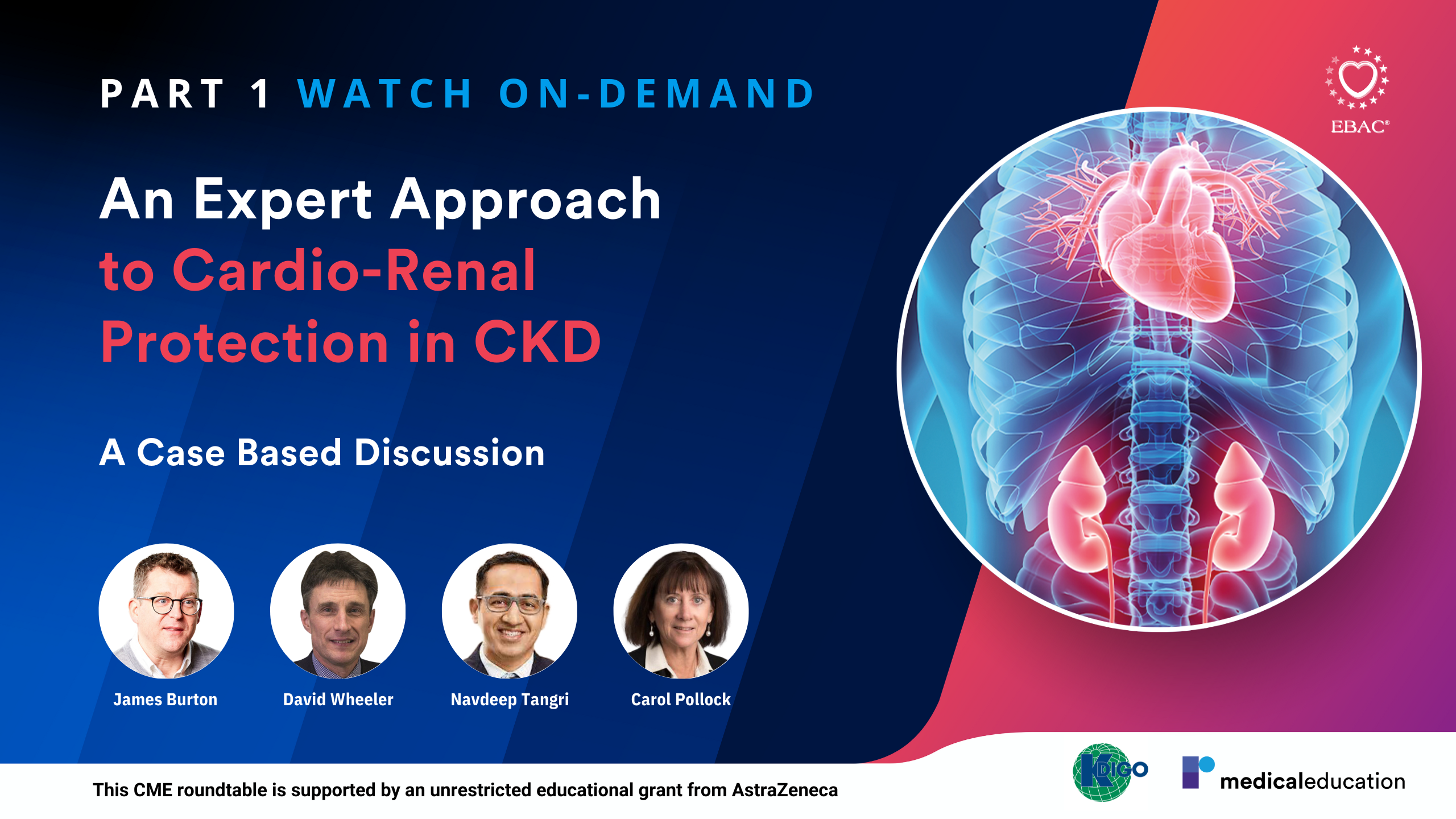An Expert Approach to Cardio-Renal Protection in CKD: Part One
Published: 16 April 2024
-
Views:
 11216
11216
-
Likes:
 7
7
-
Views:
 11216
11216
-
Likes:
 7
7
-
 Up Next
Up Next -
 2m 38sPart 2 | Session 2 What if Low Proteinuria?
2m 38sPart 2 | Session 2 What if Low Proteinuria? -
 2m 53sPart 2 | Session 3 What if eGFR Was Preserved?
2m 53sPart 2 | Session 3 What if eGFR Was Preserved?
-
 46sPart 3 | Session 1 Cardiovascular Risk in CKD
46sPart 3 | Session 1 Cardiovascular Risk in CKD -
 4m 12sPart 3 | Session 2 RAASi Data
4m 12sPart 3 | Session 2 RAASi Data -
 7m 25sPart 3 | Session 3 SGLT2i Data
7m 25sPart 3 | Session 3 SGLT2i Data -
 56sPart 3 | Session 4 MRA Data
56sPart 3 | Session 4 MRA Data -
 1m 39sPart 3 | Session 5 GLP1RA Data
1m 39sPart 3 | Session 5 GLP1RA Data
-
 8m 18sPart 4 | Session 1 KDIGO (2012/2022) Guidelines
8m 18sPart 4 | Session 1 KDIGO (2012/2022) Guidelines -
 1m 42sPart 4 | Session 2 NICE Guidelines
1m 42sPart 4 | Session 2 NICE Guidelines -
 2m 46sPart 4 | Session 3 UKKA Guidelines
2m 46sPart 4 | Session 3 UKKA Guidelines
-
 4m 26sPart 5 | Session 1 Can we use SGLT2 in higher eGFR and low albuminuria?
4m 26sPart 5 | Session 1 Can we use SGLT2 in higher eGFR and low albuminuria? -
 1m 45sPart 5 | Session 2 Any co-relation between chronic hypertension and high ACR?
1m 45sPart 5 | Session 2 Any co-relation between chronic hypertension and high ACR? -
 1m 36sPart 5 | Session 3 The pillars of care for CKD
1m 36sPart 5 | Session 3 The pillars of care for CKD -
 33sPart 5 | Session 4 Sequencing CKD therapies
33sPart 5 | Session 4 Sequencing CKD therapies -
 1m 7sPart 5 | Session 5 Continuing SGLT2i in advanced CKD (low eGFR)
1m 7sPart 5 | Session 5 Continuing SGLT2i in advanced CKD (low eGFR) -
 31sPart 5 | Session 6 Can we use SGLT2i in transplant patients?
31sPart 5 | Session 6 Can we use SGLT2i in transplant patients? -
 1m 25sPart 5 | Session 7 Lipid lowering in CKD
1m 25sPart 5 | Session 7 Lipid lowering in CKD -
 2m 7sPart 5 | Session 8 When it comes to SLGT2i, everyone is a winner?
2m 7sPart 5 | Session 8 When it comes to SLGT2i, everyone is a winner? -
 1m 37sPart 5 | Session 9 Summary / Key Learnings
1m 37sPart 5 | Session 9 Summary / Key Learnings
-
 4m 25sPart 1 | Session 1 Presentation of Case James Burton, Navdeep Tangri, David Wheeler, Carol Pollock
4m 25sPart 1 | Session 1 Presentation of Case James Burton, Navdeep Tangri, David Wheeler, Carol Pollock
-
 5m 21sPart 1 | Session 2 Discussion on Optimising RASSi Navdeep Tangri, James Burton, David Wheeler
5m 21sPart 1 | Session 2 Discussion on Optimising RASSi Navdeep Tangri, James Burton, David Wheeler
Overview
Part one of this two-part programme focuses on our current guideline-directed approach to chronic kidney disease (CKD) and how SGLT-2 inhibitors can be used to maximal effect. Chaired by Prof James Burton (University of Leicester, UK), this roundtable features expert insight from a world-renowned faculty, Prof David Wheeler (University College London, UK), Dr Navdeep Tangri (University of Manitoba, CA), and Prof Carol Pollock (University of Sydney, AUS).
Our expert panel unravel the complexities of CKD care in the context of a real-world patient case. Following this, join us for part two where the panel will revisit the patient case in reflection of recent guideline updates and provide you with evidence-based strategies for initiating pharmacological therapies that transcend the theoretical and become actionable in everyday practice.
Note, the live version of this session was CME accredited; this on-demand version is not.
Key Learning Objectives
- Recall clinical evidence and guidelines for the management of CKD patients without diabetes
- Describe current gaps and barriers in evidence-based management for CKD without diabetes
- Apply evidence based-management strategies to a case study
- Use expert-led guidance to develop an optimal management approach to CKD patients without diabetes
Target Audience
- Cardiologists
- Heart Failure Specialists
- Nephrologists
- Primary Care Physicians
More from this programme
Part 1
Case Study
Part 2
Case Polls & Faculty Discussion
Part 3
Review of Cardiovascular & Renal Data
Part 4
Review of Guidelines and Recommendations
Part 5
Audience Q&A / Panel Discussion
Faculty Biographies

James Burton
Professor of Renal Medicine
Prof James Burton is Honorary Consultant Nephrologist and Professor of Renal Medicine and Associate Dean for Clinical Research at the University of Leicester, Leicester, UK. His principal research interests are the mechanisms underlying uraemic cardiovascular disease modification of cardiovascular risk in patients with end-stage renal disease and the identification and application of novel biomarkers.
In addition Prof Burton is involved in the development and running of clinical trials; he is Chief Investigator for the NIHR funded NightLife trial investigating the impact of nocturnal dialysis on patient outcomes as well as the Kidney Research UK funded CONFIRM study exploring the utility of a novel cardiac magnetic resonance imaging (MRI) techniques in haemodialysis patients. Prof Burton is the independent Chair of two multi-centre NIHR Trial Steering Committees and sits on a number of others.
He is the current Chair of the UK Kidney Association Clinical…






Comments